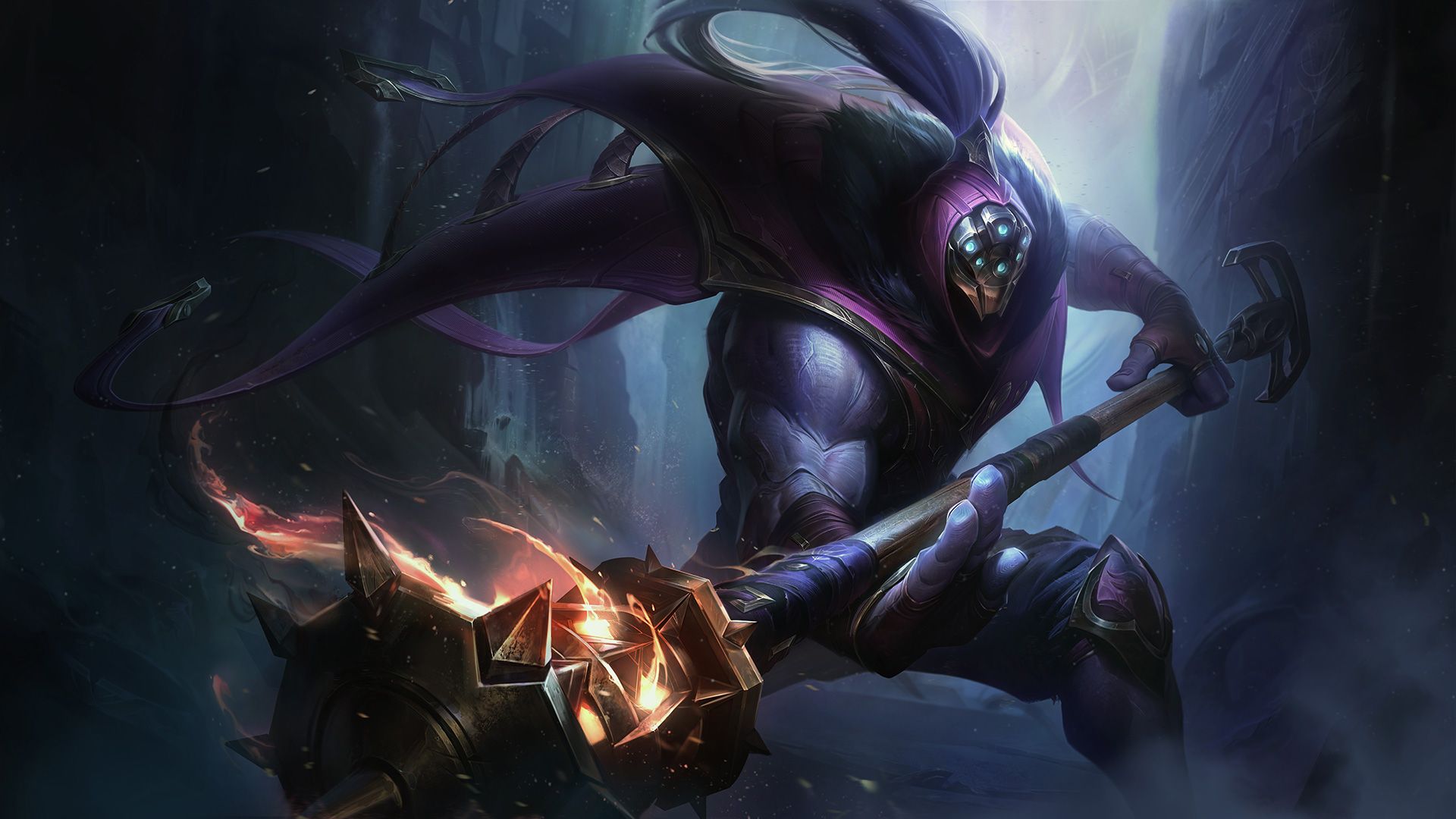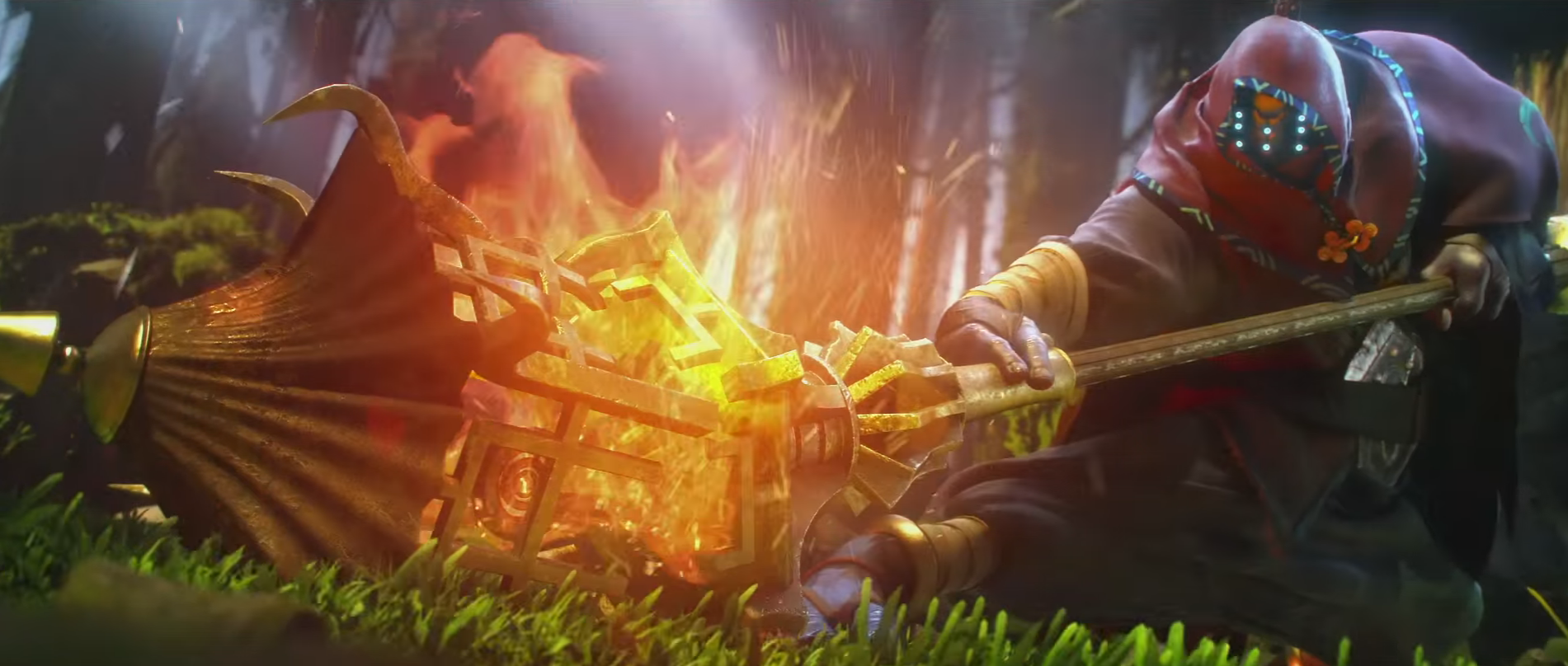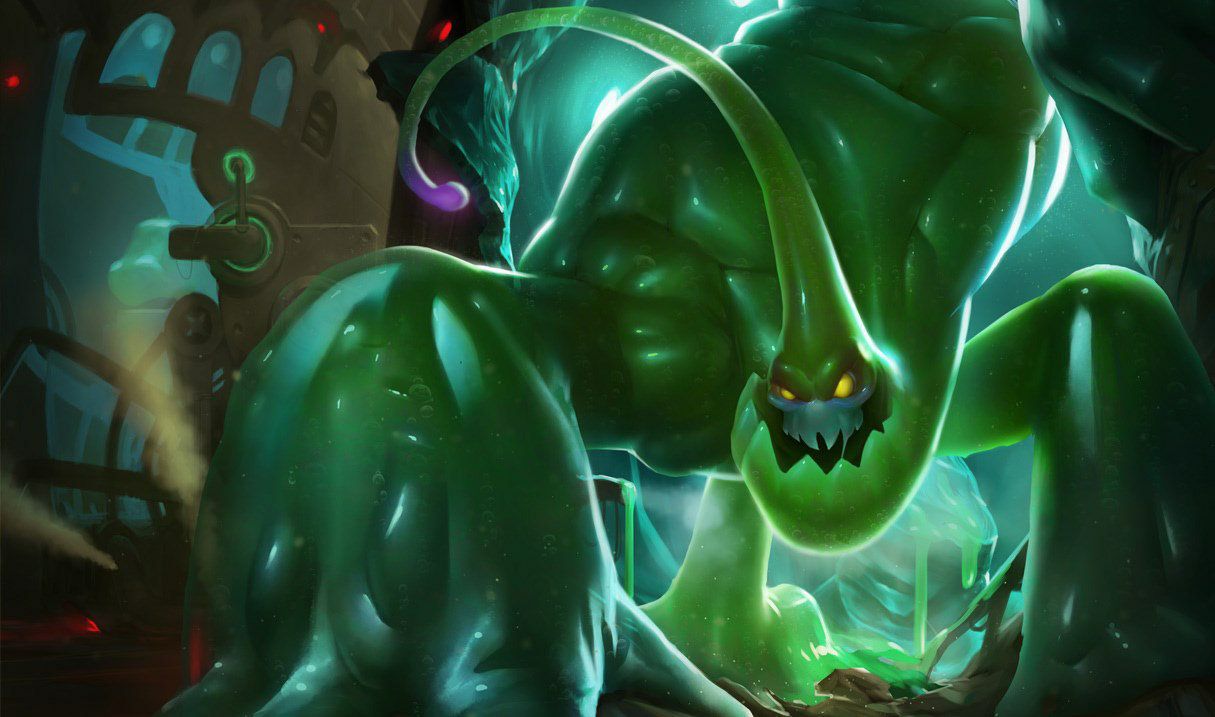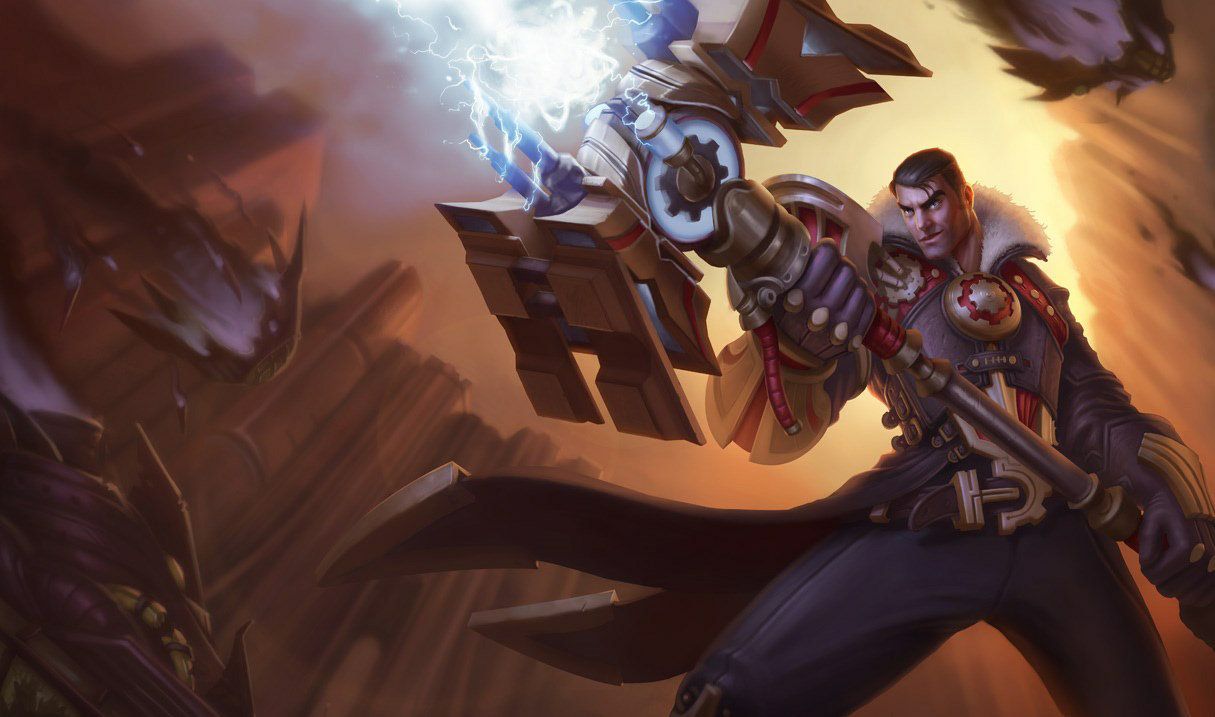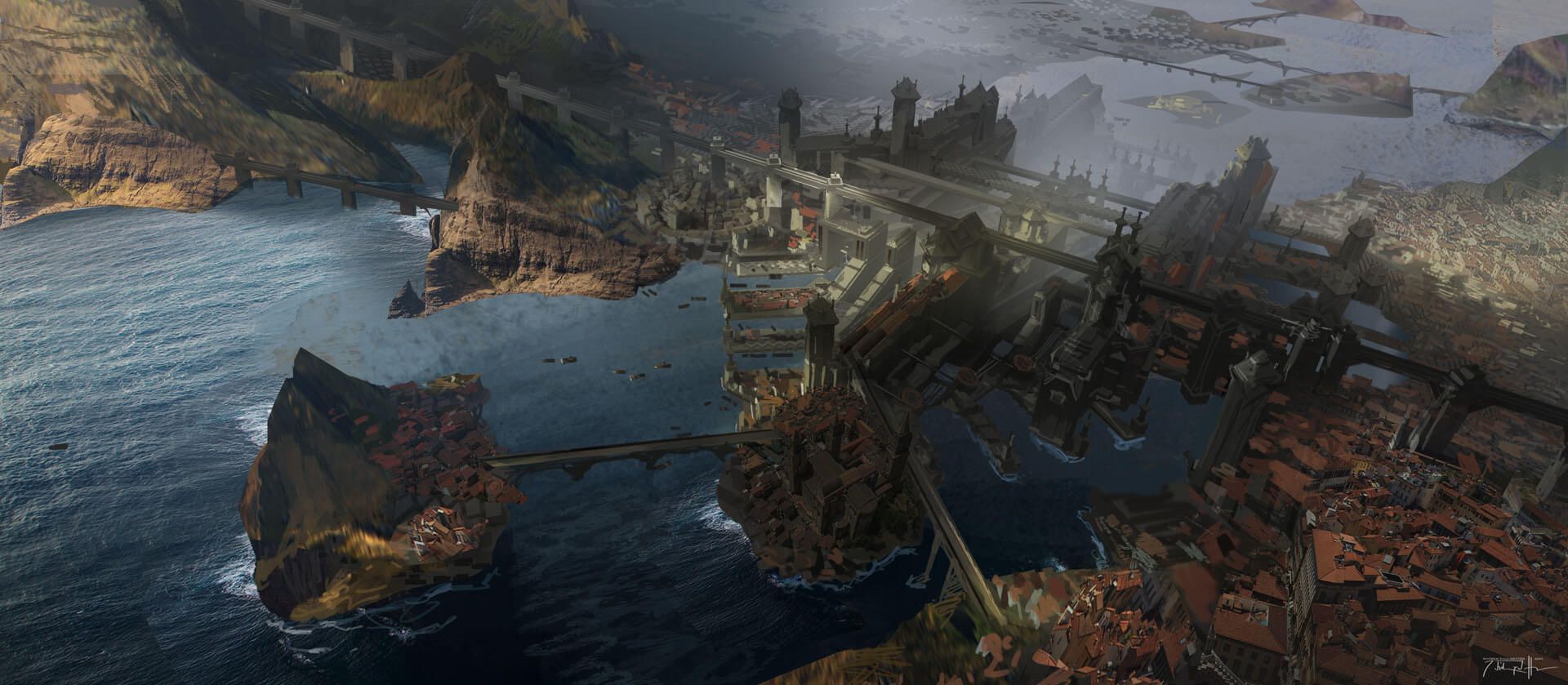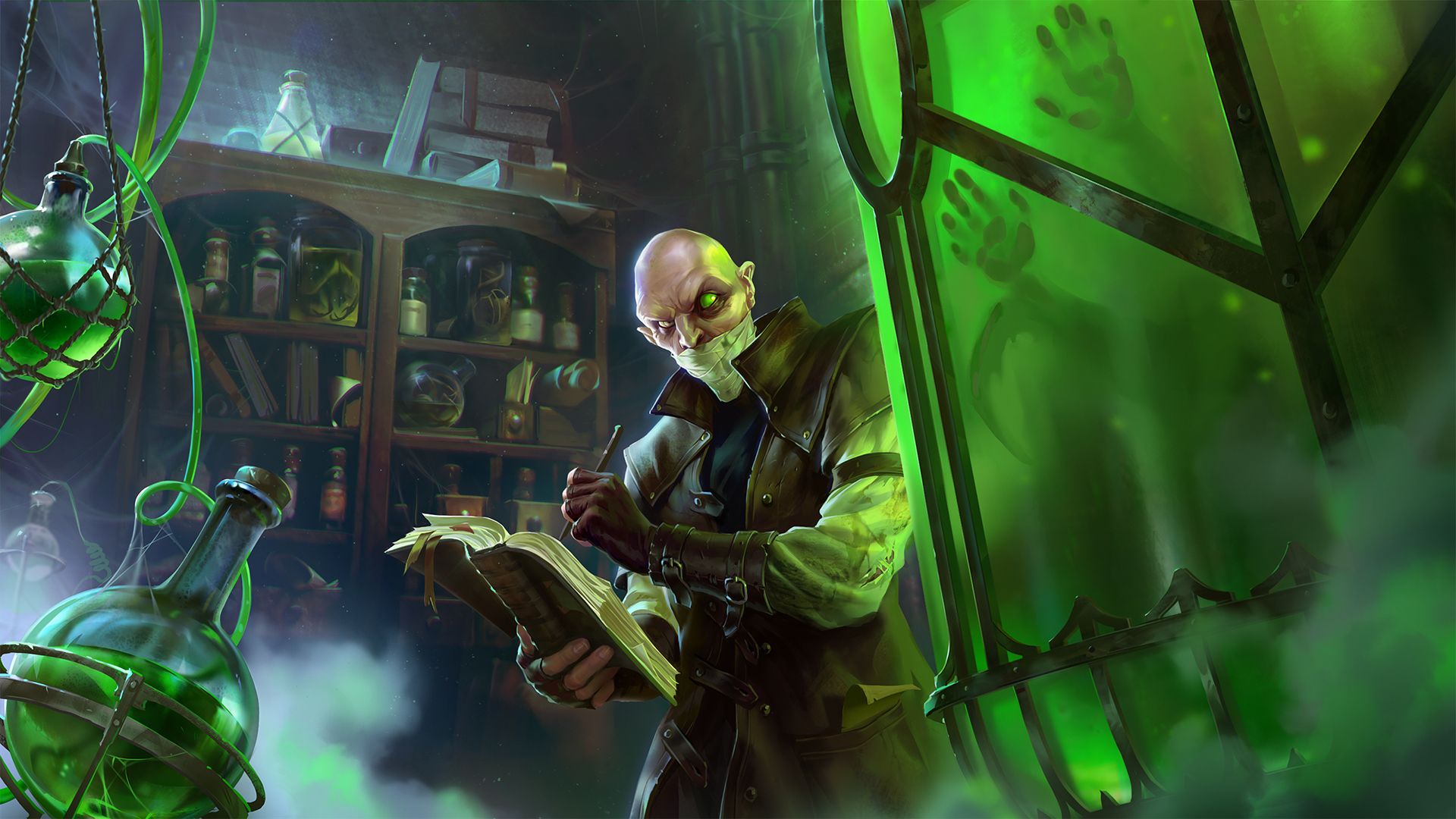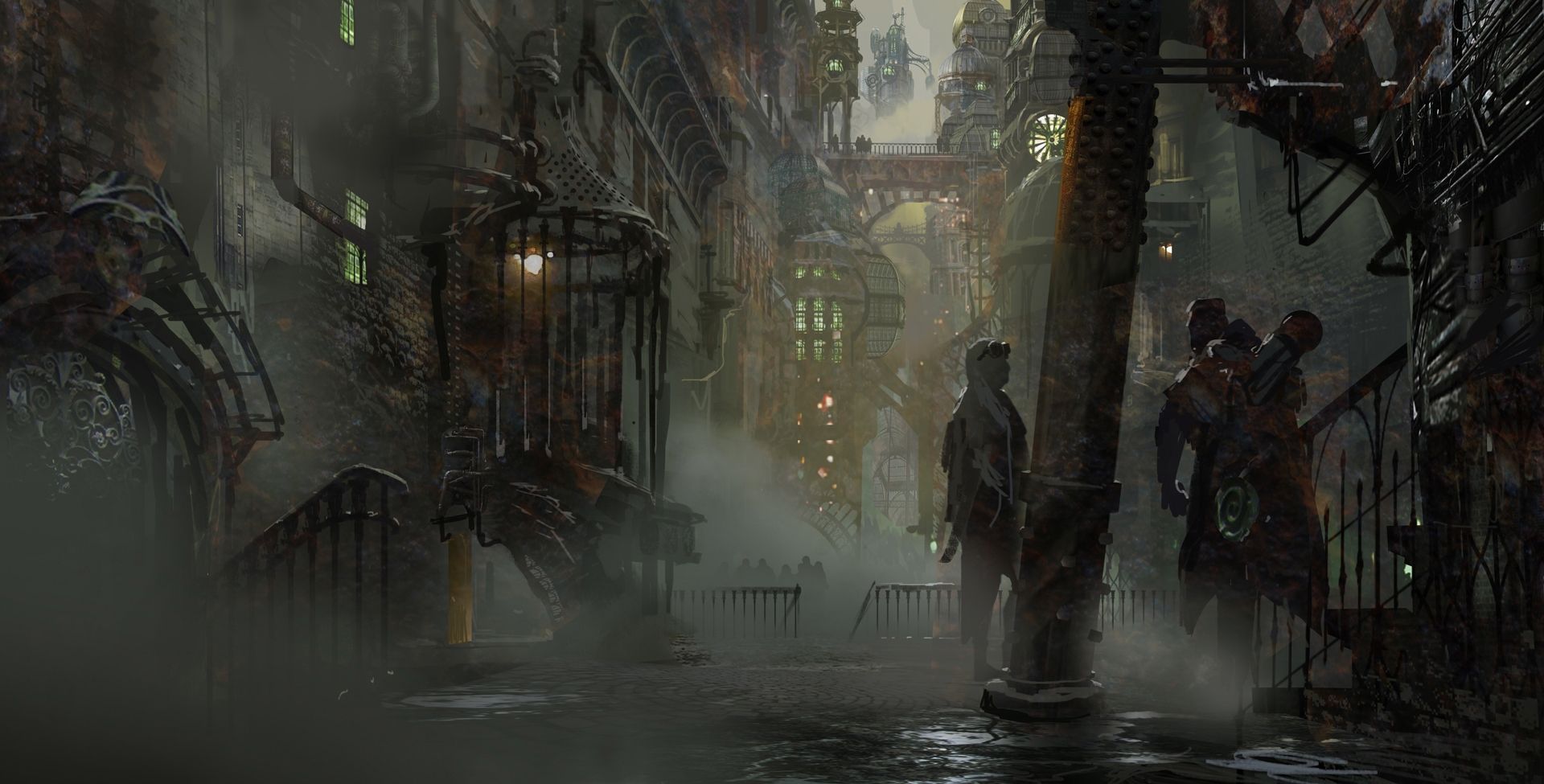I’m going to die.
Every halting breath is agony. It feels like someone has torn open my chest with a rusty saw and filled the cavity with teeth. Because someone has.
He has.
I can’t look at what he’s done to me. I stare through watering eyes at a tiny vault light in the brick ceiling, desperate to see anything but what I’ve become. Beyond lies Zaun—my city—but of the thousands of bustling souls there, not one will have noticed I’m missing. No one is looking for the man I was before.
click
The recording device has clicked on, the wax cylinder turning steadily, and my breath catches again, this time against a sob. He speaks.
“Subject ‘Thinker’ is functionally impaired. Yet hearing and recognition still present.”
click
Between the tears in my eyes and the warping effect of the thick greenish glass of the observation window, the nameless man looks like a half-melted waxen nightmare. Sunken, mismatched eyes dripping across a contorted pallid face, the bandages over his mouth growing and shrinking as he restlessly paces behind the window to get a better look at my condition.
His good eye flicks from me to the source of a deep groan in the corner of my cell. I turn to look at a hulking form, rousing itself from unconsciousness. Glowing pipes and tubes snake around and through its forearms, making them more than double their already considerable size.
As I am now, withered and... changed, the brute could snap me in half without thinking.
click
“Subject ‘Breaker’ regained consciousness at six past fourth bell. Earlier than expected. Promising! Experiment begins at... seven past fourth bell.”
click
No. No, no! Not another experiment.
click
“Establishing the baseline. Subject Thinker, answer the following questions as quickly and as accurately as possible.”
“Wha—”
“First question: what is your full name?”
“I’m not doing this! Do you hear me? I demand you release me at once. I refuse to participate in whatever sick, twisted...” My words trail off.
click
He puts down the mouthpiece of his recording device, and moves to a set of valves at the edge of the window. Without even glancing at me or the thing in the corner, he spins one open, and high-pressure, ice-cold sump water slams me into the wall.
I think I’m screaming.
An eternity later, I’m trembling on atrophied hands and knees, gasping for air. I fumble at the floor, seeking purchase through the slowly draining water, when I somehow catch my wrist on something, and my elbow buckles reflexively, slamming me face first onto the ground.
I’m still for a moment, cradling my arm where the pain is hot and alien—then I feel movement between my chest and the floor. Sharp wriggling, like I’ve fallen on a Uloan scorpion and it’s about to claw through me to escape. I roll, but it follows me. It’s on me, on my bare skin, scratching and squirming, and the skittering noise repulses me. I’m kicking and clawing and yelling and desperately trying to get it off me!
“Tiresome.”
My hands are bloodied and there’s something wrong with my wrists and I can’t get the thing off me. It’s all barbs and claws and it’s like it’s burrowed into my—my chest.
The teeth in my chest.
I remember now. There isn’t an arachnid on me. He did this to me. He carved me up and turned me into something else, something with sucking fangs grafted onto each wrist, and two columns of hungry, flexing pincers from neck to waist. And he wants me to use them to bite the thing in here with me.
He’d once strapped us both down on a rusted iron gurney, needle moving quickly and without mercy as he joined us together. Then he waited. Waited for the “process” to start, for the instincts he’d given me through surgical and chemtech sins to kick in.
When it didn’t happen—when I wouldn’t do it—everything went black.
And now I am locked in this chamber with my intended “host”.
click
“Subject found initial stimulus unpleasant. Resuming baseline questions. If the Thinker subject does not state its full name—”
“Stop, I beg you. Have mercy!” I yell.
“Duration and intensity will be increased by a factor of two. Strike that—make it three.”
click
He’s looking right at me. If he’s smiling beneath those wraps, it doesn’t reach his eyes. He seizes the valve again, and I realize what’s next. There’s nothing to hide behind, nothing to grab a hold of, and as the pipes rumble, all I can do is curl up as small as I can, and take a deep breath.
The blast of water hits so hard, so cold, the air is ripped from my lungs. I smash against surfaces I can’t identify, and up and down are meaningless. There’s a shooting pain from my ankle, and when the assault eventually ceases, I twist and drop to the floor. Once the heaving stops, I lie motionless, feeling weaker than I can ever remember as the last of the water drains from the room.
I’m going to die.
Slam. I flinch when my chem-doped cellmate smashes into the observation window. It is fury incarnate—huge, empowered fists hammering at the glass, incoherent primal yells tearing from its throat.
The glass, and the monster behind it, is unmoved.
Though each movement costs me dearly, I quietly drag myself to the other side of the floor, away from the raging beast called Breaker. It’s still smashing at the glass, knuckles bloodying, despite there being no sign of weakening the barrier. Stubborn or stupid, it keeps hitting. Even when its roaring diminishes and shifts to wordless sobs, those swollen fists won’t stop.
click
“Physical strength of subject ‘Breaker’ is within expected range of pneumatochem-muscular enhancements, but he exhibits limited to no problem-solving capabilities.”
click
Emotionlessly, our torturer taps on the glass opposite the smears from Breaker’s self-inflicted wounds. Then, with a scowl, he turns to look at me.
click
“Subject ‘Thinker’, on the other hand, may have been named hastil—”
“My name’s Hadri! Hadri Spillwether. I’m a person—not this ‘Thinker’ you keep calling me.” I reach out, desperate to touch some grain of empathy in my captor’s heart, no matter what fabrications I have to concoct. “I have a son! He’s... he’s two years old, and he must miss me terribly.”
“A son?” The bandaged man raises an eyebrow. “What’s his name?”
“L-Locke. Little Locke Spillwether—cute as a button and twice as—”
“Enough. You have no family. They perished from the same hereditary disease you yourself suffer from, characterized by accelerated aging and all the miserable infirmities that come with it. For the last thirteen years you’ve been making a nuisance of yourself to anyone who’d listen at the Zaun Academy of Sciences, seeking—no, begging for—a cure.”
His words hammer into me, cold and crushing like the water.
“And yet you repay my extraordinary gift with defiance and bad data.” Now he’s angry. “Your estimates give you five years left to live. More lies, but this time to yourself. You have three wretched years at best before you become a drooling invalid. And there’s no one to take care of you as you did your sister and father.”
There’s nothing I can say. He’s right. What little hope I had for finding a cure was just that: hope. The Academy wouldn’t help me—a swarming mass of the world’s finest minds, each unreachable and distant. Everyone had their own desperate or greedy agenda, and I was just another lost cause. Pitiful. Alone.
I’m going to die.
“But you need not die.”
My gaze snaps to his. I feel... revulsion? Loathing? Outrage? Hope. How dare he say such a thing. How dare he. How—
“How?” I choke out the question. I hate that I’ve asked it.
He doesn’t reply with words. He just slowly nods his head toward the hunched form of the thing I’m locked in with—toward Breaker. The brute is cradling his bleeding hands, rocking back and forth, avoiding eye contact with either of us. Maybe he’s incapable of speech. He’s at least three times my weight, all of it muscle, and that’s before whatever those augments on his arms are doing.
I remember when we were strapped down on the gurney. Similarly trapped together. Equally helpless despite his monstrously augmented strength. The bandaged man wants me to latch on to Breaker, to use him as a... support? A living prosthesis?
My own thoughts make me gag, and I dry heave as I scramble backward, away from Breaker.
“Disappointing.” Our torturer sounds bored. “Perhaps three years is still too remote a negative outcome for you, Thinker. Let me make it more compelling—in your weakened state, you’ll likely suffer multiple fractures each time I apply this negative stimulus. Within four more applications, I’d expect you’d be classifiable as only minimally mobile, and face down in the water, you’ll very slowly drown.”
He’s leering through the glass at me. “From previous observations, I’m led to believe it will be quite excruciating.”
click
The room’s too small. I can barely breathe. My heart is throwing itself against my ribcage like Breaker pummeling the observation window.
I look to Breaker and catch his gaze on me—he immediately looks away. There was little understanding in those eyes, but I saw shared fear and something akin to sympathy. It’s the first real human connection I’ve felt in years. Far more human than our captor.
Without turning to meet his cold, calculating stare, I ask, “And what happens if I do it? If I...?”
click
“Once an ectoparasitic melding is established, I’ll run tests on the nature of the pairing, on the extent of the parasite’s behavior-altering capabilities on the host and so on, and on the resilience of the resulting merged superorganism. The experiment will be concluded, and all this...” He waves airily at the chamber, the pipes and valves, the glass observation window. “All this will be done with.”
click
I nod absentmindedly, as if this is the most normal thing in the world, but my mind suddenly reels with realization. Testing the resilience of the organism. What a clean way to say torturing to death under a scalpel.
This is no cure—not for me. It’s a death sentence.
Finger width by finger width, I manage to pull myself to my feet, hugging the cold brick wall for support. I gasp and wobble for a moment—my ankle is broken already—before turning to face my enemy through the window.
“No.”
There’s a long pause. I can hear the sounds of Zaun—water dripping from the pipes, distant pumps, and the low, comforting rumble of never-sleeping machinery. At the very edge of my senses, I fancy I can hear fifth bell chiming.
I expect nothing of my captor. Still I’m surprised when he reaches out—
click
“Subject is... uncooperative.”
click
He spins the water valve to full strength.
Pain. The water hits like a mountain and slams me against the walls, ceiling, and floor without preference. I don’t know which is which anymore. There’s only noise. There’s only darkness. There’s only agony.
Then there’s light.
A flash so bright that the world behind my eyelids turns gold. A lung-hammering boom.
And then nothing.
I regain consciousness face down on the floor, battered and crushingly cold. I look up.
Something’s changed. Water still gushes out of the vents, though at a lower pressure. Light streams in from a hole punched near the ceiling. A way out? There are more flashes of yellow, followed by distant booms.
A keening wail pierces through the ringing in my ears. With horror, I realize it’s coming from Breaker—he’s cradling his face, blood weeping between his fingers. He charges into the wall, spins, and tumbles into the water.
The water. It’s rising.
In a panic, I try to drag myself closer to the hole, but I’m not moving. The fangs on my wrists rake across the stone beneath the water, setting my teeth on edge, but even with my aching fingers clawing at the floor, I make no headway.
I twist around to see if I’m caught on something, and blanch.
A slab of fallen debris—probably the exact piece that opened that treacherous escape route—is crushing my lower back. I kick at it, and nothing happens. I push it, and nothing happens. I try everything, squirming and screaming and flailing weakly. Slowly the block tumbles from me and splashes to the side. Around me, the rising waters flush red.
I can’t feel my legs.
“Experiment ends at... two, no, three past fifth bell.”
I turn just in time to watch the bandaged man walk away from the window and out of sight. A heartbeat later, the lights go out. The sudden explosions, my paralysis, or my defiance—I wonder which variable rendered his precious experiment worthless to him, worthy only of flushing.
Curse him.
I pull myself to a sitting position against the debris, my blood now black in the dim Zaun light. It feels like the heat is being sucked out of my core, and I’m being frozen from the inside out. I have nothing left.
Sobbing. I hear sobbing from Breaker, a boulder of despair hunkered in the corner, the tubes on his arms creating their own faint green illumination.
I keep my voice low. “H-hey.”
His head snaps up. Black streaks surround his ruined eyes, underlit by what that monster behind the glass did to his arms. An expression of anguish and loss twists on his face as he frantically angles his head to listen.
“B-Breaker?” I’m shivering. It’s hard to get the words out. “Hey, I’m s-s-sorry I don’t know your real—”
Breaker rises, splashing and stumbling, his chemtech implants casting wild shadows. He charges toward me—I squeeze my eyes shut, awaiting the impact.
Suddenly I feel a hand, hot and enormous, on my head. I open my eyes, and Breaker is crouched in front of me, clumsily patting my face and shoulders, as if to make sure I’m real.
A distant flash through the gap in the ceiling, like amber lightning, illuminates him. Under the blood and swelling, he looks so innocent. So alone.
I’m going to die.
But maybe Breaker doesn’t have to.
“Breaker? B-Breaker, you ha-have to listen to... me.” He takes my hand and turns his head to point an ear my way. “There’s a way—a way out,” I tell him. “A hole in the ceiling. You w-want to get out of here, right?”
Still holding my hand, he nods so vigorously that he jerks my body back and forth. The pain is white hot against the ice cold filling me. I almost welcome it.
“Aah! All right. Good. L-listen. Listen! Now, you’re g-going to have to let go of my ha—”
His refusal is clear in his death grip on my fingers.
Water is now lapping against the column of weakly flexing barbs on my chest. They gnash, eager to latch on to a host, as if they know their intended target is near. But I’ll die before I do that to myself. Or Breaker.
With so much of my blood swirling in the water around me, I don’t have long. I have to hurry.
I bring up my other hand and gently unwrap his. “Y-you’re going to be fine, B-B-Breaker. I promise. I just need you to... to make sure it’s safe first.” Breathing’s harder now. “Y-you can do that for me? Then we can b-both get ou-out.”
Lies, but it’s enough to get him to release me.
I nudge his elbow, guiding him to stand. Stretching despite the pain, I give him a tiny shove forward, toward the blown-open gap.
I let my arms fall back into the ice-cold water, realizing that his was probably the last warmth I’ll ever feel.
“J-j-just listen to my voice. I’ll g-guide you!” The water’s at my neck now, and I’m shaking so much it’s hard to see straight. “Forward, just a few steps. Careful, th-there’s d-debris, and—” He smashes his shin into a fallen piece of wall and yelps. “All right, y-y-y-you’re all right. S-step up onto it. Good. Now r-reach out to the w-w-wall. Feel it? Good. That’s good. There are cracks between the bricks. Use them to cl-climb. Now reach up. Reach up, Breaker. That’s it—that’s the w-way out.”
I tilt my head back to get a breath of air, the water at my jaw. At least I can’t feel most of my body now.
“Climb, B-Breaker,” I gasp. Then I stretch my neck and splutter, “Goodb-b—”
The water’s over my face, and despite everything, I’m holding this last breath. My heart beats loud in my ears. It occurs to me that I like the sound of it. I’ll miss it.
My lungs start to burn. This is it. My heart roars. My numb arms thrash. My eyes flicker open and my chest heaves, hungry for air. I cough out part of that last breath and gobble a mouthful of bitter sump water.
There is only panic.
My hand hits something, and I instinctively try to push off from it. Up. Anywhere. But I’m caught. I can’t move. There’s no air and I can’t move. Suddenly my whole vision is taken up by Breaker’s face. No! Not him, too! I struggle, but there’s nothing. My body is giving up. I’m giving up. My vision narrows and darkens; grayness fills it. I see Breaker turning, and distantly hope he’ll make it.
Something’s wrong. Or right. I can’t tell. There’s warmth and movement. I feel myself being lifted up. My body convulses and my vision turns sharp for just one beat of my weakening heart. Through the water, I see the back of Breaker’s head. My chest, no, the things in my chest sense the spine pressed against them, and flex back to strike, stretching like a too-big yawn. A welcome pain.
No. Yes. No!
... I don’t want to die!
As the barbs in my chest clamp down, I plunge my fangs deep into the sides of his neck—
CRUNCH.
I/we live!
We’re still submerged, but our lungs are full of air (and empty). Our limbs are strong and powerful (and weak and broken). We can see again (like always).
I/we push off for the faint light through the water. I/we bring up our hand to shove a metal bar out of the way. Our hand is shockingly big, and farther left than we expected, and we almost overshoot. Adjust. We’ve got it now. It’s so easy to push. The bar goes flying back. We kick upward and swim toward the hole in the ceiling, pulling ourselves up the last distance. We flop onto the roof, outside.
Air.
We cough up the water in our lungs, while our other lungs breathe deeply.
No, not our lungs... my lungs. My hearts beat hard and fast. My minds reel.
I climb down the side of the building with my powerful arms. When my feet touch the ground, it seems at once far away and slightly closer, offset to the side. I can hear with a depth and precision I couldn’t have imagined.
It smells like we’re deep in Zaun. I’m surrounded by leaking containers and heaps of wriggling, sodden trash, in a courtyard behind an old factory. High above, some distance away, a segment of fallen tower is precariously leaning against a chasm wall, yellow flashes and rumbles still issuing from secondary explosions.
The source of my freedom. Of my creation.
I start at the sound of a piece of rubble falling from the cell wall behind me, and I’m reminded just how close I came to death. At his hands.
I can’t stay here (fear!).
Before I know it, I’m running.
It’s exhilarating. I’m shocked by how fast the world goes by, how easily my legs move. Quick as a flash, I duck down an alley. There’s a gate blocking my path, but I’ve already spotted an outcropping of pipes I can vault from, and a hanging railing I can use to swing over it.
Neither of my past selves could have done this, but I can. It’s so easy.
I land lightly, and barely slow down. The impact hurts—one of my spines is broken, but it’s distant, no longer a devastating injury. Now, my strengths complement each other, my weaknesses recognized and supported. I’ve never felt this way before—greater than I was, more complete. At ease with myself.
I lope onward, exiting the alleyway and running straight into a small crowd leaving a Church of the Glorious Evolved–a mass of mechanical legs, breather masks, extraneous metal arms, and other, stranger augments.
But each and every one of these unsettling, augment-obsessed cultists stops dead in their tracks to stare at me.
“He’s got something on his back,” a mechanical-eyed man says.
“What is that?” a woman with a back-mounted prosthetic lung asks.
“It’s feeding on him!” an unseen third hysterically yells from the rear of the crowd.
Expressions change from shock to revulsion. I back up, but I’m surrounded.
Someone shoves me from behind. I try to tell them to stop.
“Pleas— —eave me— —lone.”
“—ASE. LEA— —E ALO—”
The words tumble out on top of each other, issuing from two mouths. I’ve never heard my new voice before, and it sounds both familiar and strange. The Evolved don’t seem to understand. A rock flies past my head.
“STOP-op. I HAVE-haven’t done anything-THING to you-YOU,” I beg. My words are still out of sync—it’s like talking through an echo. My voice won’t do what I want, and these people won’t listen!
A yellow-haired man steps forward from the group, attaching a heavy hammer-like prosthetic to his augmented wrist. He raises it to attack.
“I said leave me alone!” It’s my true voice. Clear as a bell—harmonious in the discord. But words won’t help me now.
Frantic, I look around and find a steam pipe near me, bridging the alleyway from above. Just before my would-be attacker strikes, I leap up, hauling the pipe down to block. The hammer pierces it, and scalding vapor blasts into his face. He falls backward, screaming.
I hear their yells and threats as I run away. I don’t know where I’m going as I charge down the dark cobblestone streets. I run past tenement blocks and corner stores, past a pair of stilt-walking chem-jacks and a spring merchant. I take stairs and corners at speed. I’m sprinting across one of the smaller bridges, iron clanging beneath my boots, when I catch a half-familiar whiff from one of the street vendors. I duck behind an empty stall and inhale deeply.
From a distant corner of my mind, I remember the smell—I remember coming here with... with Mama. She’d give me two washers for the porridge lady, and I’d carry a steaming bowl home.
Home. My eyes well up at the thought. Somewhere I can hide, somewhere I can rest, somewhere safe.
It’s not far from here!
This time, I’m running with heartsick purpose. Up three flights of stone steps on the chasm side, past the old broken glasshouse, then down two streets to the edge of the Factorywood.
Before I know it, I arrive at what was once my home. A charred husk remains, long since abandoned. My mind tries to make sense of it. This was my home (no, it wasn’t). I lived here with my mama and brother (no, I didn’t). She’d painted the walls yellow and said it was liquid sunshine (I’ve never been here).
I carefully make my way up warped stairs sodden from countless rainstorms. The railing feels familiar (alien) to my hand.
I push open the ruin of the door, and my vision swims. My happy memories of bright smiles clash with the reality of burnt remains and debris. Tears stream down my faces. Something terrible happened here, but I can’t remember.
The door to the back room has long fallen from its hinges, and the roof is collapsed in, but my eyes are drawn to the left corner, where I once slept—a small cot lies blackened with soot. I approach, and for the first time, I read the name scratched into the wall beside it:
“Palo.”
That’s me. My name is Hadri—I mean, Palo. I was both, but the me that lived here, that was Palo. Hadri’s mother died in childbirth, but Palo was raised by his mama.
What happened? An accident? An attack? Did Mama anger the wrong chem-baron? Did... did I do something without realizing?
Mama’s desk is a drenched wreck, but something glints in the pile of wood. Her hand mirror. It’s cracked, likely from the heat. I pick it up. When I was Hadri, I couldn’t bring myself to look at what the bandaged man had turned me into, but that was a lifetime ago. I’m different in so many ways, and I have to know.
I look.
A nightmare looks back. A beaten, bloodied, and blinded man stands there—forearms encircled and pierced by glowing green tubes and cables. Hooked on to his back is a sickly parasite, its shriveled arms wrapped around his neck, their syringe-like fangs barely concealed. Its withered legs dangle uselessly. Bloodshot, beady eyes peer from behind the man’s shoulder, widening in horror at what they see.
Revulsion washes over me. I drop the mirror, and my largest hands scramble to tear the parasite from its host. I’m hideous. (I’m smart now!) I’m just a failed experiment. (I’m better now!) No one could ever love me. (I love my new self!) I’ll always be alone. (I don’t want to be alone!)
Alone. I was so alone.
The bitter loneliness of two lives hits me, and I throw back my heads and howl. No one person should ever feel this. No one person can. I howl for losses doubled, and losses shared. I howl in sympathy for myself, and for the depth of loss in another. Across Zaun, I hear others take up the cry—animals, humans, and something in between—who for one moment, paradoxically, are together in their loneliness.
I collapse to my knees, my feet uselessly brushing against the floor behind me.
I will live. Not as Palo or Hadri. Not as Breaker or Thinker. I’m both, or all of them. I’m better this way.
I tear one of the half-burned curtains from the wall and throw it over my shoulders, careful not to obscure my vision.
My memories are too strange, too complex, too confusing. I can’t stay here. I walk out the door and down the steps as I try to decide where a monster like me can possibly go.
click
“In spite of, or perhaps due to, unexpected and explosive complications, stage one of the host experiment has finally completed.”
click
I freeze. My captor stands on the narrow street in front of the house, a pneumatic-powered dart gun leveled at me. Vials on his belt clink menacingly, filled with unknown liquids (it burns!), and a bag on his back suggests he has many more terrible things at hand.
He did this to me.
I can feel the fury swell in both of my chests, my hearts thumping against each other with just ribcages between them. I take an instinctual step toward him.
“I don’t think so!” he warns. He casually flicks the dart thrower to the side, pulls the trigger, and spears a large viridian beetle straight through. I watch, horrified, as the liquid in the dart releases into its body, dissolving it almost immediately, its screams all too audible in my four ears.
His gun is already reloaded, and it’s aimed at me again. I raise two of my hands.
click
“The following questions are for the Thinker entity. Answer quickly, or I’ll apply motivational pressures.”
“What?”
“Quiet. First question: what is your full name?”
The dart gun doesn’t waver as his long, stained finger hovers over the recording device’s switch.
“Hadri Spillwether.” I look around for a way out. Somewhere to run. Anything.
“Good. Next question. What was your father’s name?”
My father? I didn’t know my—wait, no, I did have a father. I looked after him when the disease worsened. His name... his name was...
“Hurry up. Answer the question!” the bandaged man demanded.
“Arvon! Arvon Spillwether!” I sounded more relieved than I expected. More desperate.
“Hmph. Faster! Where did you live? What was your profession? What did I call myself when we first met at the Academy?”
“Here! I lived he—no, wait. I... I don’t... Four-five-one! Room four-five-one at the Smellbloom Lodging House! Profession? I... Was I a clerk? I can’t... I don’t remember. It was so long ago!” I’m sweating, shaking my heads. It’s all mixed up.
click
“Pathetic. What a waste. Devolved into some sort of gestalt entity, contaminating the purity of the primary mind. Unsuitable for further exploration,” he mutters. Then he turns on his heel and starts to walk away.
I feel my faces scrunch into masks of pure rage.
He made me what I am. He set my house ablaze with chemical fire—I remember now how it burned. He exploited my hope for a cure.
And now, he will pay.
I’m four paces away from him. Now two. Then he spins on the spot and smashes a vial of something at my feet. I barely take another step when I find that my boots are glued fast to the ground. He’s two fingertips out of my reach, and I claw at the air uselessly.
“So much for being a Thinker,” he says. “I really was too optimistic. I certainly won’t make that mistake again.”
He takes a long step backward, and turns to head down a narrow alleyway. Leven Wynd—I remember it clearly. The second he’s out of sight, I hunker down and quickly untie my laces, loosening them enough to step out of my boots. With one strong leap, I’m padding barefoot after him down the wynd.
It’s dark in the alley, but my hearing is sharpened. I can hear him at the end of the first turn, still muttering to himself about subjects and sources. It stinks here, and I try not to think about what I’m stepping in as I navigate past the narrow gaps and boarded-up doorways. By the time I reach the corner, he’s halfway down the next stretch, barely visible in the gloom and the smog. I lean down to wrench a broken pipe from the ground as a weapon, and feel a rush as I straighten.
He’s gone.
Impossible! I lope onward, checking doorways as I go. The air is nasty, and I try to muffle my coughs with my curtain, but I can only cover one mouth. I’m getting dizzy, and I turn around to look back the way I came. It’s hazy—too hazy.
He’s using some kind of gas! I wrap the curtain around one of my mouths and bury the other into my shoulder, trying to breathe as little as possible. This is a trap.
I try to stagger back toward home—the corner looks farther away than I remember. I need to make it. I start to run, but one of the doors—red, metal, and spiked—suddenly opens, smashing into my face. I fall.
My limbs, all of them feel so heavy. So heavy. I think I’m crushing myself with my own weight on my back, but it’s already so hard to breathe.
I’m going to die.
The bandaged man stands over me. Tears streaming from my faces, I look up at my murderer, and I remember.
Overlaid upon his face, I see a face from before—with tinted glasses and a clean-shaven jaw. When I first met him, years ago, he strode down the hallway from lab to lecture hall, master of his environment, looked upon with admiration, envy, and something I hadn’t recognized (fear!). In his wake was the faintest scent of cologne. He had stopped and looked at me—not with pity, as I was used to, but with a shadow of excitement and anticipation. He’d introduced himself.
“Singed. You said you were Professor SIN-Singed.”
The harmony drops from my voices, and in my last moment, I am alone again.
Crushingly, painfully, deeply alone.
Singed scrambles madly among his things, desperately searching for something. A cure? A mercy?
His recording device. He clicks it on and drops to his haunches to observe.
“Oh, well done, Thinker Four. That puts you... yes... more answers than even Thinker Two! You’ve been most helpful.”
He clicks off his recording device.
It’s the last thing I hear.
